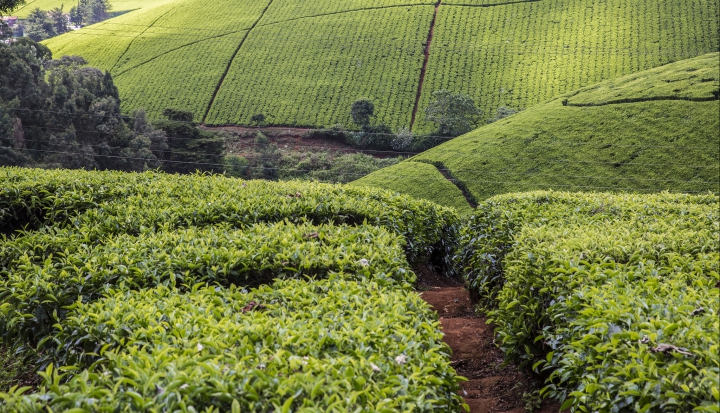At Light of Day Organics Farm and Tea Shop in Traverse City, Michigan, Angela Macke is attentive to the rhythms of creation. Through biodynamic farming, she sees soil, seed, plant, farmer, consumer, and even the moon working in harmony for good.
A registered nurse and horticulturalist, Macke first started growing tea and other botanicals (herbal teas, she says, aren’t tea at all but infusions more properly called tisanes) in 1999. At the time, she was suffering from chronic health problems, and drinking medicinal tea was part of a regimen that restored her health.
But there was no local, sustainable source for organic tea. In fact, there was no source in North America. So Macke started making her own herbal mixtures from her garden, giving them away as Christmas presents, and holding tastings.
This is when she realized her “agricultural vocation.” A lifelong devout Catholic, Macke felt called to begin farming tea in ways that would make people—and the land—healthier.
Biodynamic farming was developed in 1924 by Rudolph Steiner—philosopher, esotericist, and founder of Waldorf education. Biodynamic methods treat the farm itself as a living organism and attempt to increase soil fertility without chemicals or pesticides. Biodynamically grown food is believed to be more nutritionally dense and has less environmental impact, according to its advocates.
Likewise, Macke believes that tea grown according to these methods is higher in flavonoids, the bioactive compounds that may provide numerous health benefits: improving cardiovascular, metabolic, and neurological health and decreasing inflammation, anxiety, and the risks of certain cancers and chronic illnesses. Macke works to show people how incorporating tea and traditional tea drinking ceremonies into their lives can impact physical, spiritual, and mental health. She sees it as a way of living out her faith and being a good steward of creation.
“Tea farming represents a value system that is loving and gentle and respectful,” she says. “For so many reasons, it has been the most meaningful work of my life.”
That value system is deeply influenced by Macke’s Catholic faith and a reverence for creation that she says her parents instilled in all their children. That faith is a part of her daily work from the methods she uses to farm to the way she treats her employees and her customers.
“I always pray for guidance on the perfect combination of botanicals to hopefully give the recipient some comfort and restored balance,” she says.
Macke’s farm now grows more than 2,000 plants in hoop houses in picturesque Leelanau County near the Sleeping Bear Dunes National Lakeshore. Light of Day is the only certified organic grower in North America of Camellia sinensis, from which black, green, and white tea all derive. It’s also a certified Demeter Biodynamic Farm, the highest certification standard in the world for commercially grown food.
Macke plays classical music for her plants, which is only one sign of the loving attention she gives to what she grows. Macke harvests the tea by hand—that’s 70,000 leaves and about four days of picking for just one pound of tea. She believes that this personal touch is an indispensable component in the quality of her product.
Plus, Macke says, it just tastes better.
But it’s not just about flavor. This kind of loving attentiveness, for Macke, is an integral part of her Catholic spirituality.
“[Biodynamic farming] is inexpensive, requires no fertilizers or chemicals, encourages healthy thought processes, and connects humans to the land. It promotes good stewardship in its truest sense.”
That’s why Macke sees teaching as part of her vocation. In peak season at the farm, she welcomes as many as 300 visitors a day to her Tea Wellness Center where she teaches about the healing properties of tea and the importance of growing and eating food with love. In her “tea yurt,” she teaches tea classes, shares farming methods, and hosts “cuppings” and tea ceremonies.
“Light of Day was designed be a visible example of how agricultural-based business can be done differently,” she says. Visitors to the farm witness and taste the results of farming that is environmentally, physically, and spiritually healthy.
Macke points out the long history and religious significance of tea ceremonies in Eastern religions, but she also likens the meticulous preparations and rituals of sharing tea to the Catholic Mass. She believes the world is “starving” for such intentionality, ceremony, and ritual. For her, brewing and drinking tea is part of a healthy spiritual practice, helping to restore inner peace and come into harmony with others and with all of creation.
“This is my way of continuing to be a nurse,” Macke said in a newspaper interview. This is why her special patron is St. Teresa of Calcutta, whom she describes as a lovable, spunky, gentle, brave, intelligent, humble caregiver.
“I relate to her as both a nurse and an advocate for those who can’t speak for themselves,” she says. “She inspires me to do all I can to support our farm family, to protect the environment, and to educate people so that they can enjoy the life that God has planned for them.”
This article also appears in the June 2017 issue of U.S. Catholic (Vol. 82, No. 6, pages 45–46).















Add comment